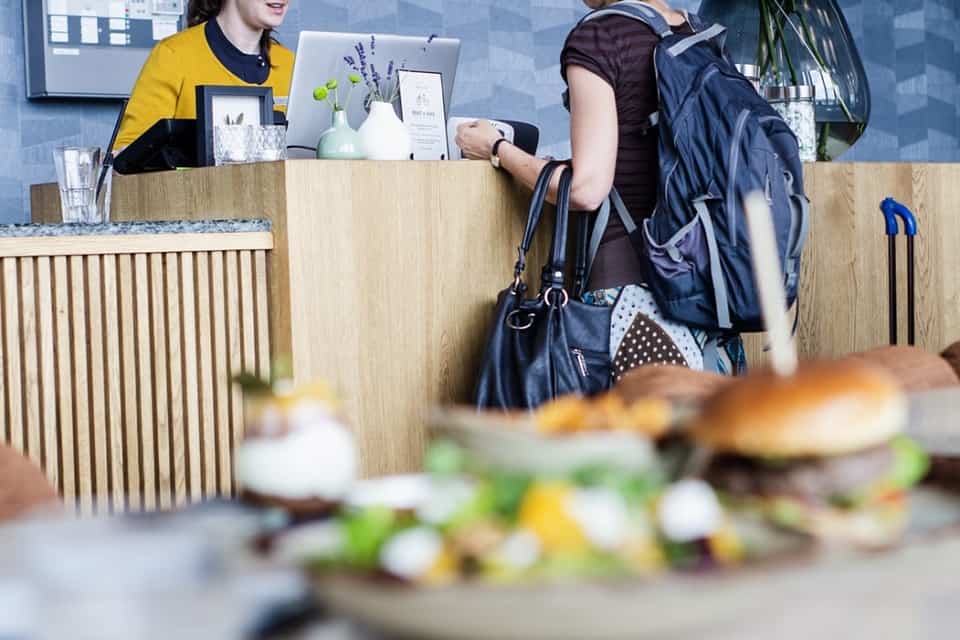Every traveler needs to think about personal safety when they go on a trip, but digital nomads also need to consider their professional security when they travel. It’s not enough to trust in fate – your business depends on you taking precautions.
Our 14 top tips for how to travel safely as a digital nomad include: don’t let other people pack your bags, keep an eye on your bags, don’t flash your gear, don’t take out what you don’t need, be wary of new friends, travel safely at night, secure your backpack, insure everything, put data in the cloud, use a VPN, watch the news, dress like a local, download a map, and don’t flash your cash around.

Table of Contents
14 Top Tips For Traveling Safely As A Digital Nomad
OK, we’ve got our 14 best suggestions for staying safe on the road as a digital nomad, if you think we’ve missed something important – we’d love to hear from you.
Never Let Anyone Else Pack Your Bag For You
I once asked a friend to carry a bag for me when he went from one country to another, he was passing it on to my partner there before I moved.
I forgot to ask him to look inside and he forgot to ask. Then when asked at the airport, whether he had packed the bags, he said “no”.
He spent a memorable hour in security holding with them going through everything in the bag. Fortunately for him, there was nothing dodgy in there. Fortunately for me, they didn’t smash everything to pieces as there was a ton of electronic stuff in there.
Never, ever let someone else pack a bag for you unless you’ve known each other for years and share a bed. They could be putting something in your cases that could get you into a lot of trouble.
Always Keep An Eye On Your Bags
Your means of earning a living is in your bag. We’d recommend that you never, ever let your bags out of your sight when you’re carrying them around in public.
I have a friend who had his laptop stolen (including the bag it was in) because he placed it between his feet in a McDonald’s in China and a thief simply slid it out and walked away with it and no, he didn’t get it back.
Put your bag on a table or on your lap whenever possible. If that’s not possible wind the strap around your leg or your arm and try to keep the body of the bag in plain sight.
We’d also recommend thinking twice about leaving your stuff with a stranger in a café while you go to the toilet. In our experience, most people are honest but if you quite literally hand someone your means of income and come back and they’re gone – good luck with getting the police to investigate your loss.
Don’t Flash Your Gear In Public
I’ve been in Asia for 20 years and I forgot this rule once. I was walking down the road carrying my Kindle in Phnom Penh and then I wasn’t carrying my Kindle, a man on a motorbike was speeding away with it.
The way he removed it from my grasp with me barely noticing was impressive to say the least. I wasn’t hurt, apart from my pride.
However, we know people who’ve been dragged down the street by a bag strap and many who’ve had phones and laptops ripped out of their hands.
Cameras are a favorite target for thieves too – wearing a crossbody strap rather than neck strap or wrist strap can make sure nobody steals equipment that has very little value unless you take it out in public.
Don’t Carry More Than You Need
My mind is always blown when someone announces they went out for the night and lost their backpack containing their camera, laptop, phone, passport, and wallet. It doesn’t get much stupider than that, to be honest.
You want to leave your stuff at your apartment whenever possible (and if necessary, keep it under lock and key). You definitely don’t need to be wandering around with your passport – if you need ID take a photocopy with you.
Be Cautious Of New Friends
We’d like to pretend that everyone you meet on the road will be an awesome person just like you and the truth is, that many people you meet will be awesome, but some will not.
There is a certain kind of person that exists to prey on naïve expats and digital nomads. Some are the nomad gurus that can easily be avoided but others are more subtle.
Beware people who come on strong and offer friendship at a strangely accelerated rate. This is true of both locals and foreigners. Be doubly aware that if somebody tries to get you into a card game or other dodgy pursuit very quickly in your relationship – it’s almost certainly a scam.
Ladies let’s put this as delicately as possible, locals are far less likely to sexually assault or rape a foreigner than your fellow drunken backpacker is. Try to go out in a group and try not to split up from your group too.
Take Care When Going Home At Night

Always, take a taxi home and don’t sit in the front seat. Don’t use motos or tuk-tuks or other forms of local transport late at night.
Walking around in developing nations late at night is often a very bad idea. It doesn’t matter how big you are – if you walk down a street and find 5 guys with weapons, you’re going to be losing your wallet and possibly your life.
Now, some places are safer than others. I’d have no issue with walking home (if you’re male) in Chiang Mai or Singapore. But you would be nuts to stagger home late at night by yourself in most of Indonesia, Cambodia or the Philippines.
Make Your Backpack As Secure As Possible
If you insist on hauling your stuff around rather than working from home; invest in a better backpack. Get one that can’t be cut open. Make sure it’s water-resistant. And even consider using a GPS tracking device so that if someone does steal it you can try to get it back.
We prefer working from home and one of the reasons is that it dramatically reduces the risks of carrying stuff around in public. My cameras go outside a lot but always strapped to me rather than in a bag.
Insure Everything That You Can
Getting things stolen works out very expensive for the digital nomad without insurance. For the digital nomad with insurance, it’s more of a pain than it is a disaster.
Don’t forget that you will have to pay the excess/copay amount before your insurer will pay out and unless you have a policy that replaces your kit with brand new versions of the kit, you will find that they pay out less than your goods are worth too – that means you’ll need some cash handy to top up their payout.
Annoyingly, travel insurance can be hard to come by when you’re a digital nomad and worse, it may not cover all your gear – you might need to take out a specialist policy if you want complete coverage.
Get Your Data In The Cloud
Seriously, hard copy backups are fine but there’s always a risk in digital nomad life that some swine breaks into your home and steals all your stuff including your backups. Make sure that you move all your latest project data into the cloud – every single day. Install software to automate this.
If you’re paranoid about having your data stolen – think about using a service with built-in data encryption too. You cannot be too cautious when it comes to your work. Lose a few hours and you can recover, lose a lifetime of work (and I say this from bitter experience) and it will take a long, long time to rebuild.
Use A VPN Wherever Possible
A VPN is a virtual private network. I used Windscribe because it’s cheap and it works just fine. It helps to secure your personal data when you’re on a public network and when you’re in countries with heavy levels of Internet censorship it lets you step outside the censor’s reach.
This can be very handy if you need to do effective research in countries like China or Saudi Arabia.
Keep An Eye On The News
It’s also worth making sure that you keep an eye on the news. If you register with your embassy (as you should if you’re going to be in a country for more than a few days) they will also have a text alert style service that will warn you if things start going a bit wonky in the country you’re in.
Civil wars, mass protests, hurricanes, typhoons, tsunamis, volcanic eruptions, earthquakes, terrorist attacks, etc. can take place absolutely anywhere, at any time.
The good news is that you can often avoid any real problems by keeping an ear to the ground (metaphorically speaking) by following local news. Then when trouble is brewing – get the heck out of town for it.
Dress Like A Local

Want to avoid offending people and getting into a brawl? Want to avoid sexual assault by locals who think you’re a lady of the night? Then work out what the local dress codes are and adhere to them. In Muslim countries, this might be wearing a headscarf as a woman and using a shapeless garment. In India, it might mean modest clothing that doesn’t accentuate your curves.
For guys, it may mean covering your tattoos, shoulders, legs and wearing shoes, not sandals. Conservative places love their dress codes for both sexes.
Download A Google Map For Offline Use
Want to avoid getting lost? Then having a Google map downloaded on your phone can really help when you find yourself in an area without signal or Wi-Fi.
We’d also recommend that you take a picture of your hotel’s business card so that you can wave it at taxi drivers when you need to get back home. Grab and Uber only work with internet connections too.
Don’t Flash Your Cash Around
This may be the worst mistake you can make. If you turn up in a relatively poor country and then show off how much money you have, you’re almost asking to be mugged on your walk home.
Keep as little cash on you as possible and try to leave all but one card in a secure spot at home too. Then if you are mugged – it’s more annoying than it is anything more.
Conclusion
Megan and I have been digital nomads for a long time and we’ve never really felt unsafe, but it is worth taking sensible precautions like those outlined in our 14 top tips for how to travel safely as a digital nomad to ensure your safety.
